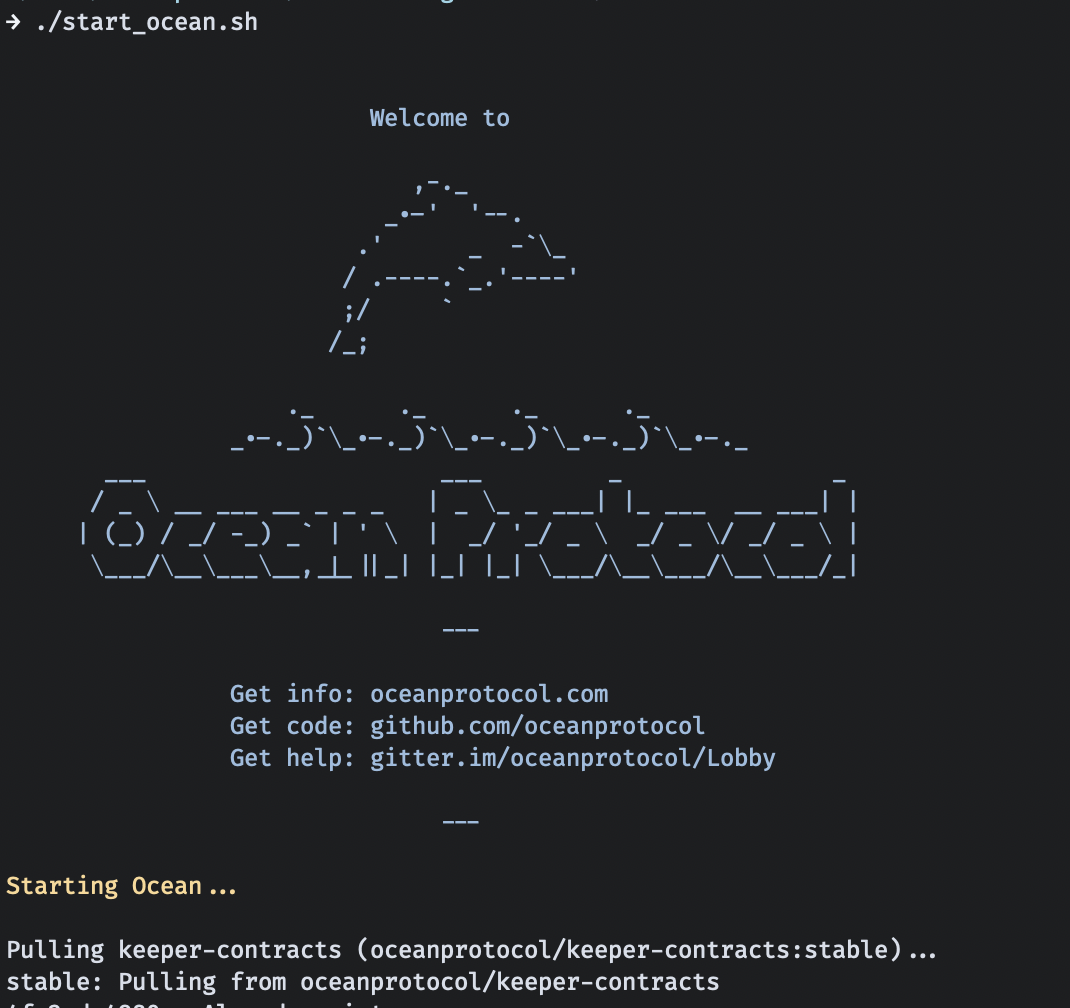Add link to Azure Storage tutorial in the docs
docker-images
🐳 Docker images and Compose for the full Ocean Protocol Network stack. oceanprotocol.com
🐲🦑 THERE BE DRAGONS AND SQUIDS. This is in alpha state and you can expect running into problems. If you run into them, please open up a new issue. 🦑🐲
Table of Contents
Prerequisites
You need to have the newest versions available of both:
Populate the following in the brizo.env file:
- All of the
AZURE_... related variables: necessary forBrizoto serve consume requests. You will get the values if you go through the Azure Storage tutorial in the Ocean Protocol docs.
Get Started
Then bring up an instance of the whole Ocean Protocol network stack with the start_ocean.sh script:
git clone git@github.com:oceanprotocol/docker-images.git
cd docker-images/
./start_ocean.sh

This will bring up the stable versions of all components, referring to their respective master branches.
To get the latest versions of all components, referring to their develop branches, pass the argument --latest:
To run as a publisher, Brizo configuration must be set with valid Azure account credentials. This is done in
./start_ocean.sh --latest
After getting everything running, you can open the Pleuston Frontend application in your browser:
Script Options
The start_ocean.sh script provides the following options:
| Option | Description |
|---|---|
--latest |
Get the latest versions of all components, referring to their develop branches. |
--no-pleuston |
Start up Ocean without an instance of pleuston. Helpful for development on pleuston. |
--local-parity-node |
Runs a local parity POA node and Secret Store instead of ganache-cli. |
--reuse-database |
Start up Ocean and reuse the Database from ganache. Helpful for development. |
--purge |
Remove the volumes, local folder and networks used by the script. |
For example, if you do:
./start_ocean.sh --latest
then the main/default docker-compose.yml will be used, so the following Docker images will all be started:
- mongo:3.6
- oceanprotocol/keeper-contracts:latest
- oceanprotocol/aquarius:latest
- oceanprotocol/brizo:latest
- oceanprotocol/pleuston:latest
To see what ports each of those listens on, read docker-compose.yml. Note that keeper-contracts runs a local Ganache node (not a local Parity Ethereum POA node).
If you do:
./start_ocean.sh --no-pleuston
then docker-compose-no-pleuston.yml will be used, so these images will be started:
- mongo:3.6
- oceanprotocol/keeper-contracts:stable
- oceanprotocol/aquarius:stable
- oceanprotocol/brizo:stable
If you do:
./start_ocean.sh --latest --local-parity-node
then docker-compose-local-parity-node.yml will be used. Read it to see what images it starts. Note that it doesn't start Pleuston, and it does start a Parity Secret Store.
If you do:
./start_ocean.sh --latest --no-pleuston --local-parity-node
then the last-selected Docker Compose file will be used, i.e. the one selected by --local-parity-node: docker-compose-local-parity-node.yml.
Parity Client Accounts
If you run the start_ocean.sh script with the --local-parity-node option, you will have available a Parity Client instance with the following accounts enabled:
| Account | Password | Balance |
|---|---|---|
| 0x00bd138abd70e2f00903268f3db08f2d25677c9e | node0 | 10000000111000111000111000 |
| 0x068ed00cf0441e4829d9784fcbe7b9e26d4bd8d0 | secret | 100000000 |
| 0xa99d43d86a0758d5632313b8fa3972b6088a21bb | secret | 100000000 |
Use one of the above accounts to populate PARITY_ADDRESS and PARITY_PASSWORD in brizo.env file to avoid asccount locked issues from the keeper contracts.
Environment Variables
The start_ocean.sh script and .env file sets defaults for the following environment variables but you can use these in combination with the Docker Compose files for further customization, e.g.:
export REUSE_DATABASE="true"
docker-compose --project-name=ocean -f docker-compose-no-pleuston.yml up
| Variable | Description |
|---|---|
REUSE_DATABASE |
The keeper-contracts component runs with ganache by default and every run will produce and deploy new instances of the keeper contracts. Ganache can be run with a specific database path by setting the env var REUSE_DATABASE to "true". By default, the ganache database will be setup in the cwd. |
DEPLOY_CONTRACTS |
skip deploying smart contracts by setting this to "false", in this case REUSE_DATABASE should be set to "true" in the previous run when using ganache |
KEEPER_NETWORK_NAME |
set to one of "ganache" (default), "kovan", or "ocean_poa_net_local" |
ARTIFACTS_FOLDER |
this is where the deployed smart contracts abi files will be available. This can be pointed at any path you like. |
In addition to these variables, when running Brizo you need to provide the Azure credentials to allow Brizo to connect to Azure. These variables can be configured in the file brizo.env.
Contributing
See the page titled "Ways to Contribute" in the Ocean Protocol documentation.
License
Copyright 2018 Ocean Protocol Foundation
Licensed under the Apache License, Version 2.0 (the "License");
you may not use this file except in compliance with the License.
You may obtain a copy of the License at
http://www.apache.org/licenses/LICENSE-2.0
Unless required by applicable law or agreed to in writing, software
distributed under the License is distributed on an "AS IS" BASIS,
WITHOUT WARRANTIES OR CONDITIONS OF ANY KIND, either express or implied.
See the License for the specific language governing permissions and
limitations under the License.
